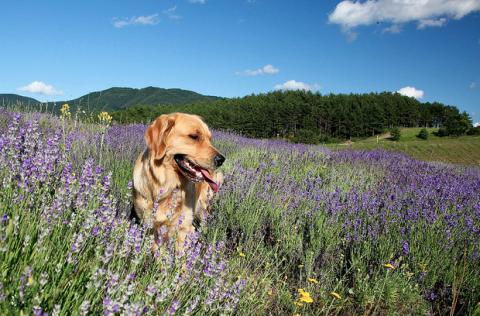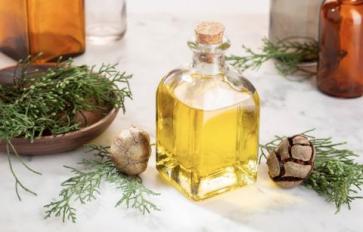
Essential oils can be a source of pleasure and healing for us. For our beloved pets, they can be a sometimes-fatal danger. This risk is doubled in the winter when closed windows can build up higher essential oil concentrations in our homes.
It’s been incredibly gratifying to watch aromatherapy reach the mainstream over the past decade, but with such widespread usage comes the risk of misinformation. Natural doesn’t always mean safe for everyone; after all, plants produce essential oils partially to deter the insects and animals which would otherwise feast upon them.
Before you start your essential oil diffuser in the same room as your bird or try out a flea collar blend on your cat or dog, please read on.
Cats and Essential Oils
Anyone who has provided a home for a cat can tell you that they are the ones who domesticated us. Despite millennia of coexistence, cats are still supremely well-adapted to the life they would have otherwise led, and that extends to their physiology.
Essential oils can be extremely dangerous for cats because they lack the enzyme (glucuronyl tranferase) which allows our livers to break down components of certain oils. These components, while harmless to us, can quickly build up to toxic levels in our small feline companions. Toxic buildup can occur without warning, especially since cats tend to hide the fact that they’re not feeling well, and the effects can be sudden, terrifying, and sometimes fatal.
Some cat owners believe their cats love essential oils since they react to them like they do with catnip – running, jumping, and rubbing up against wherever the oil is – but this behavior is neurological overexcitement, rather than pleasure.
If you have a cat in your home, the best way to ensure their safety is to speak to a registered aromatherapist, as they’ll be able to walk you through the long list of unsafe oils.
In the meantime, here are three solutions:
- If you like to use a nebulizing diffuser at night, one safe blend is two drops of geranium and one drop of frankincense; these are both calming and cat-safe when used in such a low dilution.
- Using essential oils in the bath or shower will allow you to appreciate them while keeping your cat safe, so long as you make sure to clean up afterward.
- There’s controversy over the cat safety of hydrosols (the water left over when making floral essential oils), but using a small amount directly on your skin is safe. Avoid your hands, or anywhere else your cat might lick.
Birds and Essential Oils
Most bird owners are aware that their tiny size and sensitivities leave them vulnerable to everything from non-stick fumes to the distant smell of cleaning products. Essential oils, despite their natural origins, are another hidden danger.
Diffused oils can build up quickly, while directly-applied oils are immediately absorbed in high amounts. Some bird owners (particularly parrot parents) have found that aromatherapy can help calm troubled birds, but the oil used and the type of application are critical.
Tea tree oil deserves to be singled out as the most dangerous oil for birds, purely because many well-meaning owners use it to treat minor wounds or rashes. Even highly diluted tea tree oil can be fatal to birds, and even the most holistically-minded bird owner is far better off with veterinarian-approved treatments.
If you want to use essential oils near your bird, speak to your vet or a trained aromatherapist beforehand. The safest choice is simply to use one drop of lavender essential oil in a nebulizing diffuser, set up away from their cage in an open area.
For your own usage, feel free to diffuse and spray essential oils in closed rooms which are inaccessible to your bird. (Dilute well, particularly if you have a small home.) If you use essential oil products on your skin, don’t interact with your bird for several hours, just in case they decide to have a taste!
Above all, keep a close eye on your birds, and discontinue using essential oils if you notice any adverse reactions.
Dogs and Essential Oils
Finally, some good news for aromatherapeutically-minded pet owners: dogs and essential oils are a much safer combination than many other pets.
There are three important things to remember when using essential oils with or around your dog:
- Given their keen sense of smell, even standard essential oil dilutions can be distressingly overpowering for them.
- Always dilute with water (when diffusing) or with a safe carrier oil (when applying). If you’re using the dilution directly on your dog, apply in small amounts to the back of their neck or only where necessary.
- Some essential oils are still dangerous. Some of the most common are tea tree, thyme, cinnamon, clove, and oregano, but research any oil before you use it directly on your dog.
Like people, dogs can recognize which essential oils might be useful for them. If your dog wants nothing to do with an otherwise-safe essential oil, try diluting it further in case it’s just too strong for their powerful sense of smell. If they still dislike it, put the dilution aside for your own use and try something else.
Try to avoid using essential oils on yourself where your dog might get the chance to lick you since all the safety rules change when essential oils are ingested. (This is also why the ideal place to apply essential oils to your dog is the back of their neck.)
If you enjoy diffusing essential oils, go right ahead! Just remember to avoid the dangerous oils listed above, and to avoid shutting your dog in a room with an active diffuser. Open a window, or ensure that they have an escape route into a less smelly room.
Other Pets and Essential Oils
There isn’t room here to go into essential oil safety for all the types of animals out there. From horses (who love essential oils) to mice (who are far better off without them), it’s much safer for you to do your own research.
One thing to keep in mind as you explore and learn is to avoid online-only sources. There’s a lot of misinformation out there, most of it shared by well-meaning fans or aromatherapy consultants who don’t have all the facts. (Be particularly wary of anyone who says pure essential oils are always safe in every circumstance.)
When in doubt, speak to your vet or a registered aromatherapist. By being careful and not taking any one person’s word for it, you’ll be sure to keep you and your beloved pets both happy and healthy.
Photo Credit: "Agitazione pura" by Franco Vannini is licensed under CC BY 2.0








